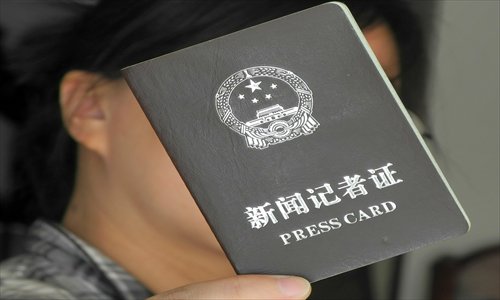Fake journalists

Yuan Renguo, president of Kweichow Moutai, the Guizhou-based liquor company, was once a journalist with the Beijing-based Consumption Daily. For a journalist he was remarkably high-profile, after all, Moutai is known as China's "national liquor."
While the company is famous for its alcohol, Yuan didn't really write much by way of articles, prompting accusations he obtained the press card for its perks.
"I've been monitoring the Consumption Daily for years and I don't think this is the only problem regarding the use of press cards," Li Xinde, the man who operates the famous whistle-blowing website known as "Public Opinion Supervision," told the Global Times.
An employee surnamed Wang with the Consumption Daily told the Beijing Times that Yuan used to write for the paper "as a special correspondent years ago, but rarely does now."
A copy of Yuan's press card was posted online in November showing that he received the license in 2009 and passed annual inspections from 2010 to 2012.
Yuan's press card was revoked by the General Administration of Press and Publication (GAPP) in late November, along with another nine staff members who had already left their positions as journalists, while the newspaper is currently under investigation for filing fake registration materials and abusing its press cards.
Netizens have called Yuan a "fake journalist with an authentic license," however, among China's journalism professionals, Yuan is not alone.
Jumping through hoops
Wei Wuhui, an expert in new media with the Shanghai Jiao Tong University, told the Global Times that press cards allow journalists, real or fake, to meet certain people and get broader access to information.
Chinese regulations also give journalists certain material benefits, such as priority treatment when using public transportation as well as accommodation when they are on duty. In addition, some tourism attractions also have discounts or even free tickets for those who are licensed.
To get the GAPP-issued card, journalism professionals have to attend a training session and take an exam. The press card must be renewed every year to ensure its validity.
According to GAPP regulations, only reporters and editors who have worked for at least a year in authorized news institutions, including newspapers, magazines, radio stations and TV networks, are eligible.
The ranks of "fake journalists," however, are made up of diverse individuals including government representatives. Four officials with the Association for Science and Technology of Zhanjiang, South China's Guangdong Province, including Huang Dongyun, director of the association, were issued press cards by the newspaper Zhanjiang Technology in 2009.
Considering the newspaper is under the direct supervision of the association, Li was not impressed by the move. "Why would government supervisors need a press card? So I submitted the evidence to the GAPP," Li said.
The four cards were revoked in September 2010 for violating the regulation.
A blow for credibility
Yuan's case drew heated online criticism, mainly focused around the argument that it would harm the credibility of news reports if people who aren't real journalists have credentials, given the fact that they may be seeking commercial interests and manipulating media reports.
"Some newspapers establish illegal branches and sell cards to people who are far from qualified, for profit. I once sued a local paper in Guangdong for publishing fake news in this way and I won," Li said while showing the court order to the Global Times.
GAPP has published a statement saying that they would launch a campaign from January 15 to March 15 next year which will ask media outlets to check on the status of their press card holders, as a response to Yuan's case.
Li told the Global Times Wednesday that in light of the official crackdown on "fake journalists," he had just submitted evidence to the authorities indicating that another four people with the Consumption Daily had obtained press cards illegally. The GAPP confirmed that it is investigating.
Protecting journalists
Qiu Ziming, a journalist with the Economic Observer, was wanted by local police after he reported a trading scandal involving the Zhejiang-based Kan Group in 2010. He was accused of not having a press card and spreading "fake news."
An official from the GAPP told the Global Times that a valid press card is also a means to protect the safety of journalists. Qiu's case was one example, though local police in Zhejiang later apologized to him.
Luo Jingqing, a research assistant with UK-based newspaper The Telegraph, told the Global Times that Chinese employed by foreign media are also issued licenses by the Ministry of Foreign Affairs.
"When we are reporting a mass incident, especially when the police are involved, having a press card is much safer," said Luo.
Are press cards necessary?
Somewhat ironically, given the plethora of "fake journalists" receiving press cards, many real journalists do not have their own credentials.
GAPP said that currently there are about 250,000 licensed reporters. Newcomers to the profession with less than one year's experience do not have press cards, nor do many who have changed their employers.
Given the complicated situation, some argue that cards are not necessary in the new media era since everyone can publish information online. However, Web portals and commercial websites which provide a significant amount of news for the public do not qualify as news institutions.
Wei said that from a hard-news point of view, posts on "user-driven media" such as blogs or Weibo are not acknowledged as reliable reports, but "tips." "Information posted online is defined as public sentiment rather than opinion in China and is monitored for reference. The idea is that certified journalists are to write reports that lead public opinion," said Wei.